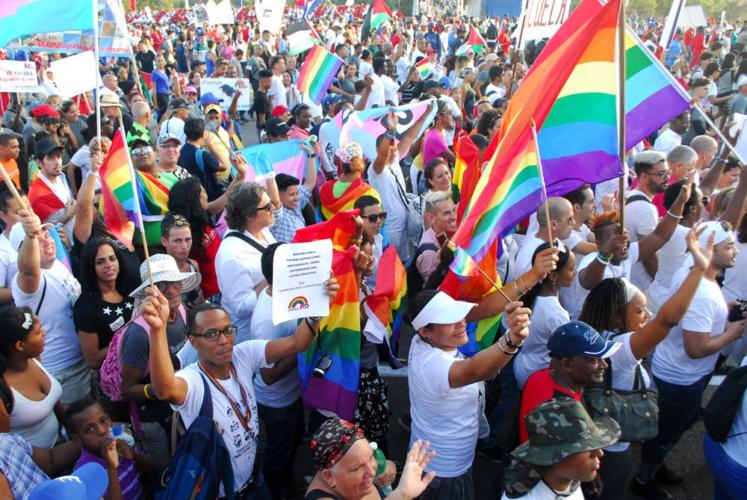
12 More Days Against Homophobia and Transphobia:
To Each Person Their Rights
After more than a decade of educational work, the Cuban Days against Homophobia and Transphobia in its twelfth edition enters a new stage in the fulfillment of its purposes. These are part of the policy of the Party and the State to confront any type of discrimination in our society, including that based on sexual orientation and gender identity of people.
Posted on 10 May, 2019 – 15:51 by Francisco Rodríguez
Translated and edited by Walter Lippmann for CubaNews.

Photo: Yoandry
It is not for pleasure that these days vary their conceptual scope every two years, in a journey that has already allowed them to make visible several key scenarios of still frequent discriminatory episodes for these reasons, such as families, work and schools.
On this occasion, the Days aim to influence the legal culture of our citizens in relation to these issues, under a phrase that synthesizes and fuses with exactitude the concrete objective to be achieved together with the highest purposes that we permanently pursue as an ideal of justice in socialism: all rights for all people.
For someone not attentive to the realities of homophobia and transphobia, an issue in addition to the international political debate on human rights, it might seem strange or even excessive this insistence on addressing and banishing this old problem in our national context.
However, the evidence of the scientific and community work carried out by the National Center for Sex Education (Cenesex), the main organizer of these days, points to the fact that we still have a long way to go on that road of respect for sexual rights, in the face of violations and damages – not always visible – suffered by homosexual, bisexual and transgender people in everyday life, both in the subjective realm of human relations and in the link with institutions.
It is true that there are evident positive changes in the social perception of this phenomenon and in the implementation of social inclusion policies that we have been conquering as a country for more than a decade. These are part of a systematic and long-term strategy that has its greatest turning point every May, around the celebration of May 17, as the International Day against Homophobia and Transphobia.
The result of all this evolution is palpable. Pronouncements against discrimination based on sexual orientation and gender identity in the country’s main policy documents. Approval of the first law that explicitly protects sexual diversity, which is precisely our Labor Code. And more recently, the proclamation of a Constitution that proscribes any discriminatory action against people for that and other reasons, in addition to recognizing equal rights for all types of families.
There are also many other transformations in social consciousness and practice that are sometimes difficult to quantify, but they are there, and those of us who have experienced this gradual process, as protagonists and beneficiaries, can clearly perceive them.
Of course, it is not possible to aspire to a process of cultural transformation as profound as the dismantling of homophobic and transphobic prejudices in our society, takes place in a linear manner, without contradictions or even stagnation or conjunctural setbacks.
That is why the legislative changes that have to accompany the new Magna Carta are essential. These must take into account this problem that is not limited to a single legal norm, but constitutes a transversal theme that must entail a more inclusive look at each economic and social phenomenon.
However, specialists and jurists from Cenesex who participate in the working groups to develop these upcoming laws already identify several where the principle of non-discrimination on the basis of sexual orientation and gender identity requires an approach. This is the case, of course, of the Family Code, but they also mention the Criminal Code, the Criminal Procedure Act, the Civil Registry Act, the Labor Code itself, as well as others that today do not even exist or are in lower-ranking legal systems such as resolutions, internal regulations, and procedures, in areas as dissimilar as public health, education and others.
In this sense, the reflection recently made by Manuel Vázquez Seijido, deputy director of Cenesex, is basic. He points out that “discrimination in a rule is not necessarily denigrated, undervalued or prohibited access to any service of a group of people; it is also when it is omitted, it is not clear, when only one sector of the population is recognized and others are unprotected, when certain needs are not regulated”.

You must be logged in to post a comment.